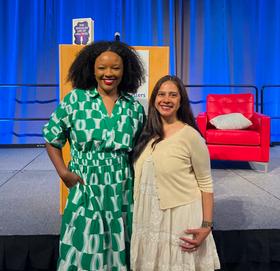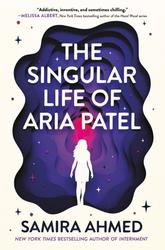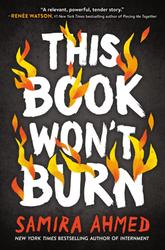 On the morning of Saturday, June 14, as "No Kings" protestors formed lines along the street outside the Portland, Ore., convention center, author Samira Ahmed announced to a hall full of booksellers and publishing professionals, "By the way, this speech will be political."
On the morning of Saturday, June 14, as "No Kings" protestors formed lines along the street outside the Portland, Ore., convention center, author Samira Ahmed announced to a hall full of booksellers and publishing professionals, "By the way, this speech will be political."
Leah Johnson of Loudmouth Books in Indianapolis, Ind., introduced Ahmed by discussing her recently released YA novel, The Singular Life of Aria Patel (Little, Brown Books for Young Readers). "More important now than ever," Johnson opened. "It's a phrase we're using a lot for marketing but, in a time when books are being banned now more than ever, when our friends and family are being disappeared off the street, Samira's work is more timely than ever. It's more than timely--it's urgent. And it should be required reading."

|
|
| Samira Ahmed (r.) with bookseller Leah Johnson of Loudmouth Books in Indianapolis, Ind. | |
It's an honor, Ahmed said, to be given the opportunity to speak to indie booksellers. "You helped make my career. I was an Indies Introduce title and that was the first huge acknowledgment I received from the book community about my words being important." Ahmed's note of appreciation was followed by an energetic, passionate, and often frustrated speech about a question she keeps returning to: How can I be brave?
When Internment, Ahmed's YA novel about a U.S. internment camp for Muslim American citizens, was published in 2019, a teacher spoke with Ahmed about using the book in her classroom. The teacher hoped to include the title in a student directed reading program that allowed teens to pick their own books. Two other teachers said they felt it was an inappropriate choice because "there were no south Asians in their school." Scared of upsetting her colleagues and risking her job, the teacher decided not to offer the book to her students. "How," the teacher asked Ahmed, "can I be brave?"
 "This week has been a lot," Ahmed said. "It feels like, in the 100 years since Trump's second term began, we have experienced so much. We are witnessing the rise to power of the worst bullies you knew in middle school and they're just as bad as you thought they were." But, what's so frustrating, Ahmed sighed, is "just how stupid they are--they are deeply uncurious people." But today, she said, "is No King's Day! And millions of Americans are marching, saying 'not in my name and not on my watch.' " We are a community, Ahmed said, and "I believe in community over kings. Community over kings is how we're going to be brave together."
"This week has been a lot," Ahmed said. "It feels like, in the 100 years since Trump's second term began, we have experienced so much. We are witnessing the rise to power of the worst bullies you knew in middle school and they're just as bad as you thought they were." But, what's so frustrating, Ahmed sighed, is "just how stupid they are--they are deeply uncurious people." But today, she said, "is No King's Day! And millions of Americans are marching, saying 'not in my name and not on my watch.' " We are a community, Ahmed said, and "I believe in community over kings. Community over kings is how we're going to be brave together."
That question, Ahmed said, "became the foundation of This Book Won't Burn, a YA novel about book banning." Ahmed asked the audience: "How can I stand up for something that is right even if I am scared? If I might face reprisals? How do I do this?" Bravery, she said, "is not a natural state of being. It definitely isn't for me." What bravery is, she explained, is a series of small choices brought on by three types of life-altering events: trauma, destiny, and chance. "No hero at the start of any book or any movie or any story starts out saying 'Yeah, I'm brave.' " An example? Star Wars. "Luke doesn't set out to be the leader of a rebellion. His 'want song' in the beginning is that he wants to go to the Tosche Station to pick up power converters."
 "I don't think there's been a single day in my life when I felt that I was brave," Ahmed admitted. "But feeling that is the thing that makes us not assholes. There are a lot of people who think of themselves as big, beautiful, brave, patriots/fascists. But they're almost, to a person, cowardly bullies." For the rest of us, Ahmed said, "even if we don't think of ourselves as brave, deep down we want to think we could be the hero--that we could meet the moment. And that moment for all of us is now."
"I don't think there's been a single day in my life when I felt that I was brave," Ahmed admitted. "But feeling that is the thing that makes us not assholes. There are a lot of people who think of themselves as big, beautiful, brave, patriots/fascists. But they're almost, to a person, cowardly bullies." For the rest of us, Ahmed said, "even if we don't think of ourselves as brave, deep down we want to think we could be the hero--that we could meet the moment. And that moment for all of us is now."
Booksellers, authors, publishers are meeting the moment by helping children and young readers find "the story they really want but don't know it's for them yet, that may live in their heart forever," Ahmed said. When a bookseller walks a child "over to a shelf and helps them find that story," the choice they're making to help that child in that moment is a brave choice. "You're not standing in front of a tank, you're not stopping a bullet, but we all know that stories can save lives. Maybe that book you just gave that kid is the book that will save their lives. It will be the book that makes them feel seen." This, Ahmed said, is power. This, Ahmed said, is bravery. --Siân Gaetano, children's and YA editor, Shelf Awareness

